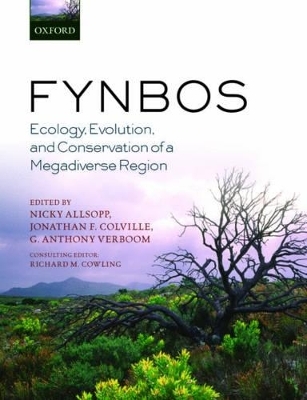
Fynbos
Oxford University Press (Verlag)
978-0-19-877776-2 (ISBN)
South Africa's fynbos region has intrigued biologists for centuries. It has achieved iconic status as a locus of megadiversity and therefore a place to study the ecological underpinnings of massive evolutionary radiations. Researchers have made great advances over the past two decades in unravelling the complexities of fynbos ecology and evolution, and the region has contributed significant insights into the adaptive radiations of large lineages, conservation science, pollination biology, invasive plant biology, and palaeoanthropology. Lessons from the fynbos offer much of value for understanding the origin, maintenance, and conservation of diversity anywhere in the world.
This book provides the first synthesis of the field for 20 years, bringing together the latest ecological and evolutionary research on the South African global biodiversity hotspots of the Greater Cape Floristic Region - the iconic fynbos and succulent karoo. It explores the historical and modern physical and biological environment of this region, the circumstances and processes which have fostered its remarkable biodiversity, and the role this diversity has played in the emergence of modern humans. It also discusses the challenges of contemporary management and conservation of the region's biodiversity in the face of accelerating global change.
Dr Nicky Allsopp manages the Fynbos Node of the South African Environmental Observation Network. She started her research career investigating nutrient uptake specializations of fynbos vegetation and followed this with studies of nutrient patterns and processes associated with vegetation degradation in most of the major biomes in South Africa. While working in communal rangelands, she became interested in the social dimensions of environmental management. Recently she served as an editor and author on the South African Department of Science and Technology's Global Change Research Plan. She is also involved with the Fynbos Forum which promotes science-management-decision making communication and action. Dr Tony Verboom holds an associate professorship in the Department of Biological Sciences at the University of Cape Town, teaching topics in systematics, evolutionary ecology and land plant diversity. Research-wise he is interested in questions relating to speciation, adaptation and the processes that underpin the spatial organization of biodiversity. Much of his research has involved the use of systematic tools to understand better the assembly of the modern Cape flora. To date, Dr Verboom has published 39 papers in international peer-reviewed journals. He regularly reviews for international journals and currently serves as an associate editor for Austral Ecology. He also co-edited a special issue of Molecular Phylogenetics and Evolution entitled 'Origins and evolution of a biodiversity hotspot, the biota of the African Cape Floristic Region'. Dr Jonathan Colville holds a NRF-Research Career Advancement Fellowship and is currently based at the South African National Biodiversity Institute (SANBI) within the Kirstenbosch Research Centre, where he conducts research on the ecology and evolution of South Africa's insects, as well as their conservation and value as ecosystem service providers. Most of his research focuses on investigating the patterns and processes of insect diversity, with a particular interest on the insect faunas of the Greater Cape Floristic Region, in which several insect groups show clear signatures of adaptive radiation. Dr Colville serves as an associate editor for African Entomology and is a member of the Entomological Society and Lepidopterists' Society of Southern Africa. He is an avid natural historian of insects and plants: in 2002 he was involved in the scientific discovery of the World's most recent insect order, and in 2011, he was involved in the discovery of the World's first jumping cockroach.
1. Vegetation types of the Greater Cape Floristic Region ; 2. Landscapes, rock types and climate of the Greater Cape Floristic Region ; 3. Drivers, ecology and management of fire in fynbos ; 4. Floristic and faunal Cape biochoria: do they exist? ; 5. Cenozoic assembly of the Greater Cape flora ; 6. Speciation and extinction in the Greater Cape Floristic Region ; 7. The shifting landscape of genes since the Pliocene: terrestrial phylogeography in the Greater Cape Floristic Region ; 8. Stone age people in a changing South African Greater Cape Floristic Region ; 9. The assembly and function of Cape plant communities in a changing world ; 10. Biotic interactions ; 11. Plant ecophysiological diversity ; 12. Biological invasions in the Cape Floristic Region: history, current patterns, impacts, and management challenges ; 13. Impacts of climate change in the Greater Cape Floristic Region ; 14. Conserving the Cape Floristic Region ; 15. People, the Cape Floristic Region and Sustainability ; 16. Geography, climate and biodiversity: the history and future of mediterranean-type ecosystems
| Erscheinungsdatum | 31.01.2016 |
|---|---|
| Verlagsort | Oxford |
| Sprache | englisch |
| Maße | 190 x 248 mm |
| Gewicht | 802 g |
| Themenwelt | Naturwissenschaften ► Biologie ► Botanik |
| Naturwissenschaften ► Biologie ► Evolution | |
| Naturwissenschaften ► Biologie ► Ökologie / Naturschutz | |
| ISBN-10 | 0-19-877776-0 / 0198777760 |
| ISBN-13 | 978-0-19-877776-2 / 9780198777762 |
| Zustand | Neuware |
| Haben Sie eine Frage zum Produkt? |
aus dem Bereich


